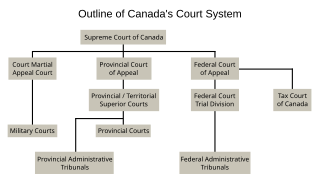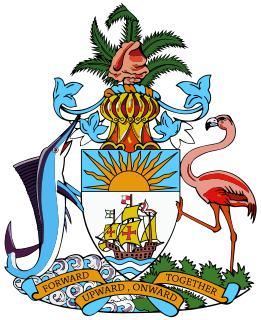An appellate court, commonly called an appeals court, court of appeals, appeal court, court of second instance or second instance court, is any court of law that is empowered to hear an appeal of a trial court or other lower tribunal. In most jurisdictions, the court system is divided into at least three levels: the trial court, which initially hears cases and reviews evidence and testimony to determine the facts of the case; at least one intermediate appellate court; and a supreme court which primarily reviews the decisions of the intermediate courts. A jurisdiction's supreme court is that jurisdiction's highest appellate court. Appellate courts nationwide can operate under varying rules.
In the United States, a state supreme court is the ultimate judicial tribunal in the court system of a particular state. On matters of state law, the decisions of a state supreme court are considered final and binding on state and even United States federal courts.

In the United States, a state court has jurisdiction over disputes with some connection to a U.S. state. State courts handle the vast majority of civil and criminal cases in the United States; the much smaller in case load and personnel, United States federal courts, handle different types of cases.

The United States courts of appeals or circuit courts are the intermediate appellate courts of the United States federal court system. A court of appeals decides appeals from the district courts within its federal judicial circuit, and in some instances from other designated federal courts and administrative agencies.
The Courts of England and Wales, supported administratively by Her Majesty's Courts and Tribunals Service, are the civil and criminal courts responsible for the administration of justice in England and Wales.
The Supreme Court of the State of New York is the trial-level court of general jurisdiction in the New York State Unified Court System. It is vested with unlimited civil and criminal jurisdiction, although outside New York City it acts primarily as a court of civil jurisdiction, with most criminal matters handled in County Court.
In common law systems, a superior court is a court of general competence which typically has unlimited jurisdiction with regard to civil and criminal legal cases. A superior court is "superior" relative to a court with limited jurisdiction, which is restricted to civil cases involving monetary amounts with a specific limit, or criminal cases involving offenses of a less serious nature. A superior court may hear appeals from lower courts.
The original jurisdiction of a court is the power to hear a case for the first time, as opposed to appellate jurisdiction, when a higher court has the power to review a lower court's decision. Original jurisdiction refers to the right of the Supreme court to hear a case for the first time. It has the exclusive right to hear all cases that deal with disputes between states, or between states and the union government. It also has original jurisdiction over cases brought to the court by ordinary people regarding issues to the importance of society at large.

The court system of Canada forms the judicial branch of government, formally known as "The Queen on the Bench", which interprets the law and is made up of many courts differing in levels of legal superiority and separated by jurisdiction. Some of the courts are federal in nature, while others are provincial or territorial.

The courts of Scotland are responsible for administration of justice in Scotland, under statutory, common law and equitable provisions within Scots law. The courts are presided over by the judiciary of Scotland, who are the various judicial office holders responsible for issuing judgments, ensuring fair trials, and deciding on sentencing. The Court of Session is the supreme civil court of Scotland, subject to appeals to the Supreme Court of the United Kingdom, and the High Court of Justiciary is the supreme criminal court, which is only subject to the authority of the Supreme Court of the United Kingdom on devolution issues and human rights compatibility issues.
The Alaska Court of Appeals is an intermediate court of appeals in the State of Alaska's judicial department, created in 1980 by the Alaska Legislature as an additional appellate court to lessen the burden on the Alaska Supreme Court. The court of appeals consists of a chief judge and two associate judges, who are all appointed by the governor of Alaska and face judicial retention elections every eight years; the chief judge of the court of appeals is selected from among the three by the chief justice of the supreme court to serve a two-year term.

The judiciary of Australia comprises judges who sit in federal courts and courts of the States and Territories of Australia. The High Court of Australia sits at the apex of the Australian court hierarchy as the ultimate court of appeal on matters of both federal and State law.

The Supreme Court of South Australia is the superior court of the Australian state of South Australia. The Supreme Court is the highest South Australian court in the Australian court hierarchy. It has unlimited jurisdiction within the state in civil matters, and hears the most serious criminal matters. The Court is composed of a Chief Justice and as many other judges as may be required.

The Supreme Court of Oklahoma is one of the two highest judicial bodies in the U.S. state of Oklahoma and leads the judiciary of Oklahoma, the judicial branch of the government of Oklahoma.
The supreme court is the highest court within the hierarchy of courts in many legal jurisdictions. Other descriptions for such courts include court of last resort, apex court, and highcourt of appeal. Broadly speaking, the decisions of a supreme court are not subject to further review by any other court. Supreme courts typically function primarily as appellate courts, hearing appeals from decisions of lower trial courts, or from intermediate-level appellate courts.

The Oklahoma Court System is the judicial system for the U.S. State of Oklahoma. Based in Oklahoma City, the court system is a unified state court system that functions under the Chief Justice of Oklahoma who is its administrator-in-chief.

The District Court of the Virgin Islands is a United States territorial court with jurisdiction over federal and diversity actions in the United States Virgin Islands, a United States territory and more specifically an insular area that is an unincorporated organized territory. The court sits in both St. Croix and St. Thomas. Unlike United States district courts, judges on the District Court of the Virgin Islands do not have life tenure, as the court is not an Article III court. Instead, the court is an Article IV court, created pursuant to Congress's Article IV, Section 3 powers. Appeals of the court's decisions are taken to the United States Court of Appeals for the Third Circuit in Philadelphia.

The basis of the Bahamian Law and legal system lies within the English Common Law tradition. Justices of the Supreme Court, Registrars and Magistrates are all appointed by The Governor-General acting on the advice of the Judicial and Legal Service Commission, which is composed of five individuals who are headed by the Chief Justice as their chairman. The Chief Justice and the Justices of the Court of Appeal, including the President, are appointed by the Governor-General on the recommendation of the Prime Minister after consultation with the Leader of the Opposition. Once appointed, the salaries and other terms of appointment of the Chief Justice, Justices of Appeal and Justices of the Supreme Court cannot be altered to their disadvantage. Justices of the Supreme Court can serve until the age of 65 years and, where agreed among the judge, the Prime Minister and the Leader of the Opposition, may serve until the age of 67. Justices of Appeal can serve until the age of 68 years and, where agreed among the judge, the Prime Minister and the Leader of the Opposition, may serve until the age of 70 years. The law of The Bahamas makes provisions for the appointment of 12 Justices to the Bench of the Supreme Court, inclusive of the Chief Justice, and for five Justices of the Court of Appeal, inclusive of the President. The Chief Justice, as Head of the Judiciary, is an ex officio member of the Court of Appeal, but only sits at the invitation of the President.

The Supreme Court of the Dominican Republic is the highest court existing in the Republic and is, therefore, the head of the judiciary in the country.













